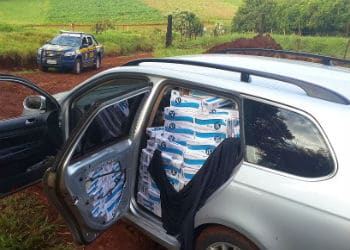A new investigation into the cigarette smuggling trail between Paraguay and Brazil lays out the inner workings of a criminal economy that generates huge profits for everyone from sophisticated organized crime networks to the president of Paraguay.
The report by news site Nós examines the smuggling dynamic in the eastern Brazilian state of Santa Catarina, where authorities seized 7.7 million packets of cigarettes in 2016 and 11 million so far this year.
Nós traces these contraband cigarettes to Tabacalera Del Este, a factory owned by the family of Paraguayan President Horacio Cartes, which produces an estimated 50 percent of the contraband cigarettes sold in Brazil.
According to Nós, only 10 percent of cigarettes produced in Paraguay are sold on legal markets — 5 percent for domestic consumption and 5 percent for legal exports.
The contraband trade is highly attractive due to the huge discrepancy in taxation levels, with Paraguay only charging a 16 percent in tax rate compared to Brazil’s 80 percent, reducing the cost to the consumer from around $2.20 a pack to around $0.95, Nós states.
Many of these cigarettes enter Brazil through the contraband hub of Ciudad del Este, where numerous smuggling networks and corrupt security forces ferry them across the border.
The contraband packs are then transported to their destination by Brazilian drivers who commonly earn between $220 and $630 a trip. The drivers often move their loads using stolen vehicles; seven out of ten vehicles police have seized from smugglers were stolen and there are now car theft rings dedicated exclusively to stealing vehicles for cigarette smugglers, according to Nós.
If the drivers get caught, they rarely spend long in prison, instead skipping bail and returning to work, Nós reports.
It is even rarer for police to work up the chain to the criminals that finance and coordinate the smuggling networks, as the drivers know little and talk less. Nevertheless sources in the security forces told Nós that these were no small-time criminals, but rather extremely wealthy individuals who have built criminal empires on the back of the trade.
InSight Crime Analysis
The combination of high profits with low risk compared to more traditional criminal activities such as trafficking drugs or arms has seen smuggling of contraband cigarettes emerge as a major criminal economy in countries around the region, from Mexico to Chile.
SEE ALSO: Coverage of Contraband Smuggling
The huge profits on offer have attracted not just smuggling rings but a whole range of underworld actors including organized crime networks, insurgent groups and money launderers.
As Nós documents, Paraguay is the epicenter of this trade, producing far more cigarettes every year than domestic and legal export demand can justify. However, with President Cartes and his Tabesa company among those profiting the most from the business, it seems unlikely the government will take serious action either to crack down on smuggling networks or to alter the low-tax regime that creates the economic incentive underlying the trade.

